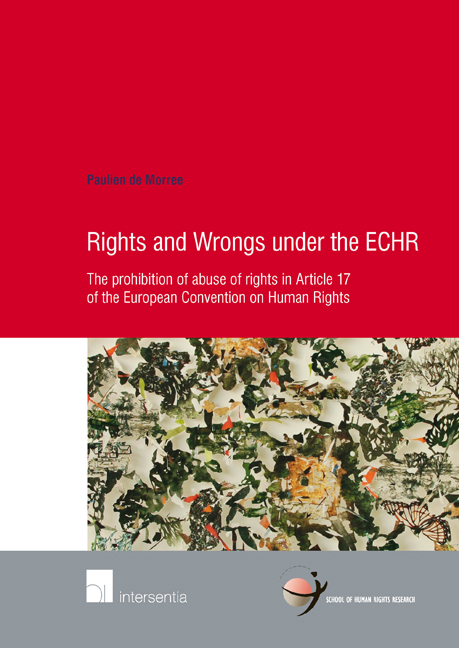 Rights and Wrongs under the ECHR
Rights and Wrongs under the ECHR Book contents
- Frontmatter
- Acknowledgements
- Contents
- List of Abbreviations
- Chapter 1 Introduction
- Chapter 2 The Creation of the European Convention on Human Rights
- Chapter 3 The Strasbourg Case Law on Article 17 ECHR
- Chapter 4 The Interpretation of Article 17 Echr in Legal Doctrine
- Chapter 5 Other Abuse Clauses in Human Rights Law
- Chapter 6 The Concept of Abuse of Rights
- Chapter 7 The Concept of Militant Democracy
- Chapter 8 The German ‘Wehrhafte Demokratie’
- Chapter 9 Militant Democracy in the Context of the ECHR
- Chapter 10 Conclusions
- Bibliography
- Table of Cases
- Samenvatting
- Curriculum Vitae
- School of Human Rights Research Series
Chapter 4 - The Interpretation of Article 17 Echr in Legal Doctrine
Published online by Cambridge University Press: 12 December 2017
- Frontmatter
- Acknowledgements
- Contents
- List of Abbreviations
- Chapter 1 Introduction
- Chapter 2 The Creation of the European Convention on Human Rights
- Chapter 3 The Strasbourg Case Law on Article 17 ECHR
- Chapter 4 The Interpretation of Article 17 Echr in Legal Doctrine
- Chapter 5 Other Abuse Clauses in Human Rights Law
- Chapter 6 The Concept of Abuse of Rights
- Chapter 7 The Concept of Militant Democracy
- Chapter 8 The German ‘Wehrhafte Demokratie’
- Chapter 9 Militant Democracy in the Context of the ECHR
- Chapter 10 Conclusions
- Bibliography
- Table of Cases
- Samenvatting
- Curriculum Vitae
- School of Human Rights Research Series
Summary
INTRODUCTION
In the previous chapter we have seen how the EComHR and the ECtHR have interpreted Article 17 ECHR. We have seen that their approach is inconsistent and raises many questions regarding the functioning of the abuse clause in the context of the ECHR. Because of a lack of clear criteria for the interpretation of Article 17 ECHR, the provision has increasingly been applied to a wide range of allegedly abusive activities. In addition, case law revealed ambiguity about how Article 17 ECHR should be applied. Over the course of time a wide range of different applications have evolved that seem to be applied unsystematically.
This chapter turns to the academic debate on Article 17 ECHR. Notwithstanding its limited practical relevance in the decisions and judgments of the Commission and the Court, Article 17 ECHR has been the subject of academic debate since the Convention entered into force. The provision's ambiguous nature has repeatedly drawn the attention of legal scholars. And with the increase of references to Article 17 ECHR in the case law of the Court, the interest in the provision by legal scholars has also experienced an upsurge. This chapter will examine the contemporary interpretation of Article 17 ECHR in legal doctrine. It will discuss how they read the scope and legal consequences of the provision and the methods of its application. Subsequently, it will discuss the academic debate that has unfolded on the current interpretation and application of Article 17 ECHR by the Strasbourg organs. Every now and then references will be made to relevant case law on Article 17 ECHR when legal scholars have explicitly cited these cases to substantiate their claims. To a great extent, these cases will overlap with the cases discussed in the previous chapter, but occasionally they may not.
DIFFERENT ADDRESSEES OF ARTICLE 17 ECHR
Article 17 ECHR is unique in the sense that it is the only provision that addresses both the States Parties that have to guarantee the fundamental rights in the Convention and individuals and groups who enjoy these rights. Several legal scholars have argued that the different addressees in Article 17 ECHR – states, groups and persons – are subject to different norms that stem from the provision.
- Type
- Chapter
- Information
- Rights and Wrongs under the ECHRThe prohibition of abuse of rights in Article 17 of the European Convention on Human Rights, pp. 67 - 98Publisher: IntersentiaPrint publication year: 2016
